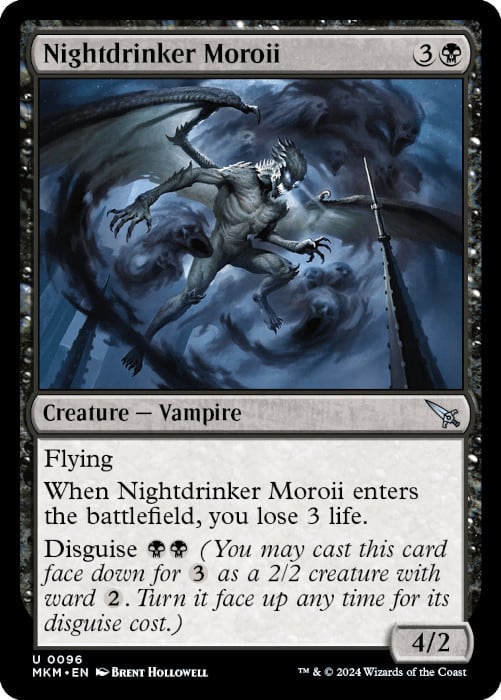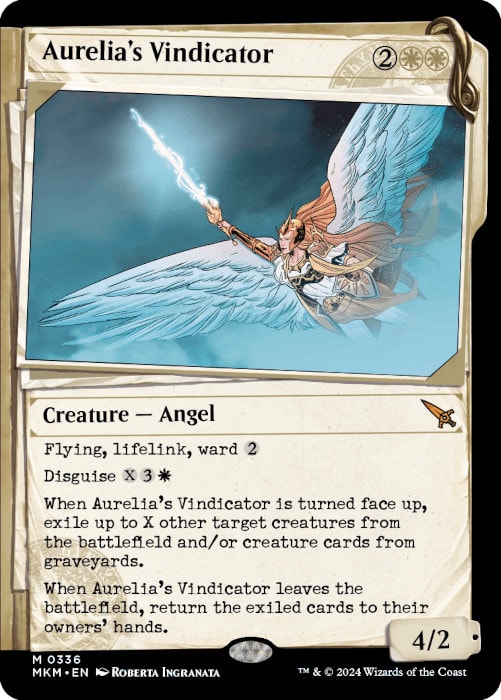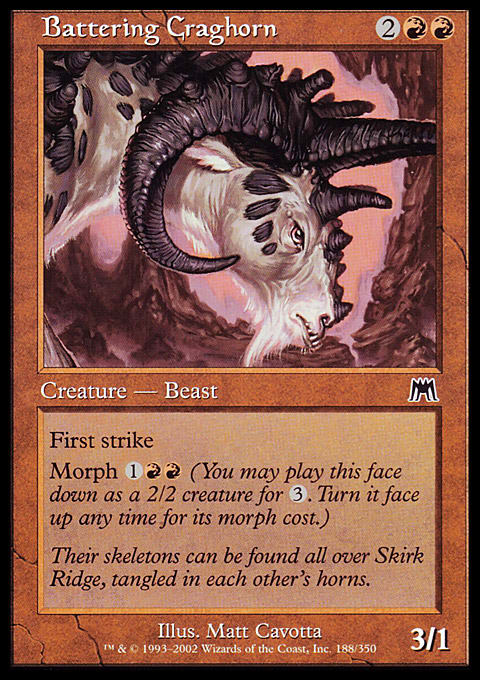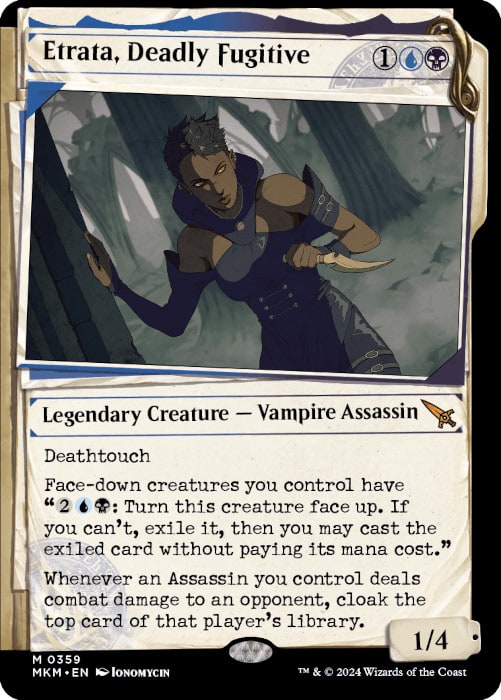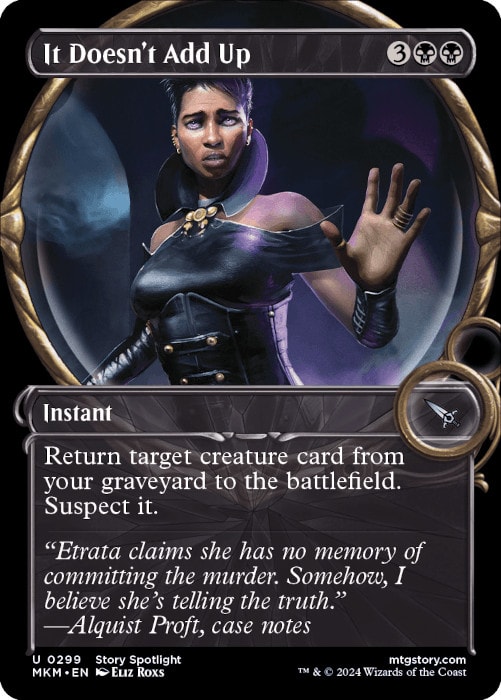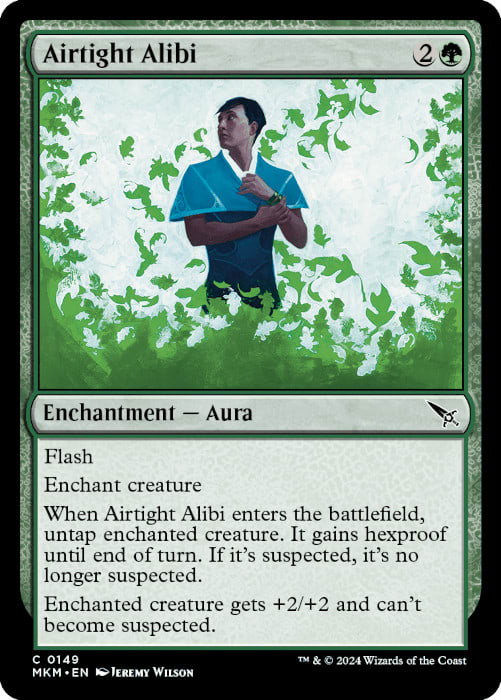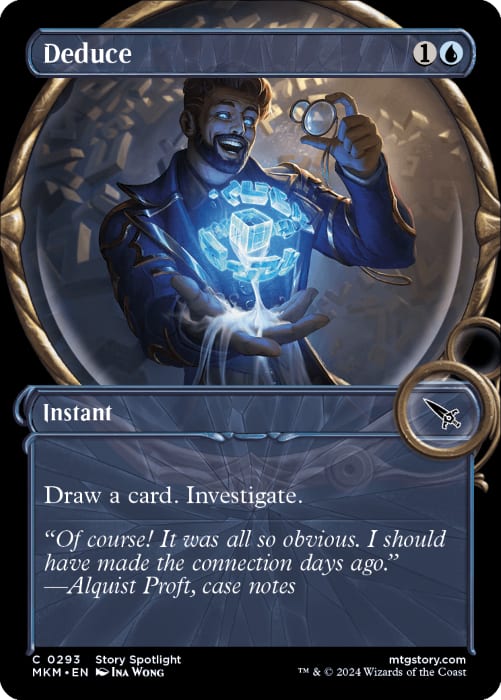It's a murder most foul!
Murders of Karlov Manor is right around the corner, returning us to the plane of Ravnica but not in a "Return to Return to Return to Ravnica" sense. Rather, this is a backdrop set, that is a set that is happening on a plane but not focused on it.
Instead, the focus of Murders at Karlov Manor is a murder mystery set based around solving a string of murders happening across Ravnica. It's honestly a fun and refreshing backdrop for a Magic set, something that is unique and that we've never seen before. All of the set's themes and mechanics are bent around this murder mystery theme, which is a lot of fun.
There are a bunch of cards already previewed and the big preview stream was earlier this week, which means we now know all of the set's mechanics, and today I'm going to go over them all!
Disguise
Remember morph? Well it's 2024 now, so now we have disguise!
Yes, you read that correctly, disguise is exactly the morph ability, just with the facedown creature gaining ward 2. This is important, because the power creep on creatures since the days of Onslaught has been significant, and poor grey ogre isn't very impressive when it comes to Constructed play. Giving it ward does a lot for actually letting you get to safely untap and unmorph it.
We can see this design principle in a few of the morphs already revealed, in that it's more about getting a discount or effect rather than sizing. Nightdrinker Moroii will ding you for three if you cast it, but not if you morph and unmorph it to bash in the air. Aurelia's Vindicator has shades of Angel of Serenity, providing potential removal as well as recursion.
However, both morphs follow what is unofficially termed "the morph rule" that was established in Kahns of Tarkir. It states that if your opponent has four or less mana, they will not be able to unmorph a morph that will beat a 2/2 in combat. This means that there will be no nasty surprises in combat unless your opponent has at least five mana, and is why you see the awkward 2 toughness on Aurelia's Vindicator and Nightdrinker Moroii.
Personally, I'm not a big fan of this rule, as it makes combat with morphs extremely binary; if they have four or less mana, block, if they have five or more, don't block. Old school morphs were much more varied, with cards like Zombie Cutthroat that could blow you out even for zero mana. There doesn't need to be insane "gotchas" like Zombie Cutthroat or two commons in the same set for the same morph cost (Skirk Commando and Battering Craghorn) where one punishes you for blocking and one punishes you for not, but having some variety among morphs makes things much more interesting.
Regardless, like morph, disguise probably won't have a huge impact in Constructed, but will be a major player in the Limited format.
Cloak
Adjacent to disguise is cloak, which is essentially just an updated version of manifest (minus the top of library stuff) for 2024.
Certain effects will instruct you to cloak cards, turning them face down and allowing you turn them face up for their mana cost if they are a creature. Like disguise, these creatures will also have ward 2, and if they have a disguise cost (or morph cost) you may flip it up for that cost as well.
We can see how this is used on Expose the Culprit, which will flip down and reshuffle your disguise creatures. Perhaps even more interesting is Etrata, Deadly Fugitive, which cloaks cards from the top of your opponent's library, but then lets you spend four mana to flip them. If they're not a creature, you get to cast them anyway!
Cloak probably won't be a huge factor in the set, but is a fun twist on disguise.
Cases
What would a murder mystery set be without cases to solve? A case is an enchantment that acts a lot like a saga, but rather than advancing naturally every turn, you have a job to do!
Each case has three chapters, as we can see on Case of the Filched Falcon.
The first one happens without any prompting, as in Case of the Filched Falcon, when it enters the battlefield, you investigate (more on this later!).
The second chapter is something you need to solve. At the end of the turn, it will check to see if the condition is met, and if it is, you have "solved" the case.
The third chapter is your reward for having solved the case. For Case of the Filched Falcon, you get to spend three mana and sacrifice it to animate a noncreature artifact into a 4/4 flier, which is a pretty nice package deal.
There's some pretty fun design space here, as we can see in Case of the Stashed Skeleton. Two mana for a 2/1 with menace that is suspect (more on this later!) is reasonable, and then if it ends up being removed, you solve the case and get to cast Demonic Tutor.
These sort of puzzle into reward cards are super fun and it's going to be very interesting to see where else they can go with it.
Suspect
Speaking of suspect, it's another new mechanic that shines a light on your creature and modifies it slightly in a very flavorful way.
Now of course, if this was all that suspect did it would be, well, suspect, but there are a ton of cards that care about a creature being a suspect and use it in different ways.
Something like Convenient Target uses suspect offensively on your opponent's creatures, removing their ability to block in the style of Hammerhand. Something like It Doesn't Add Up uses suspect like a drawback on an instant speed reanimation spell.
However, the fun stuff comes from things that care about a card being suspect or not suspect.
Agrus Kos, Spirit of Justice is happy to dole out suspicion on entering the battlefield or attacking, which again can remove blockers, but then it can also exile those suspects (as well as creatures that may have been suspected in another way). On the other side of things is Airtight Alibi, which is your typical +2/+2 flash enchantment, but also flavorfully removes suspicion from a creature as well as preventing it from being suspected again.
This feels like an important Limited mechanic, but given the look of cards like Agrus Kos and Convenient Target, it looks like it may have legs in Constructed too.
Collect Evidence
Y'all like graveyard mechanics, right? Well check out collect evidence!
Collect evidence is another variation on kicker, a way to further augment your spells by paying a cost. In this case, the cost is indicated by a number which refers to the total mana value of cards you exile from your graveyard.
For example, Vitu-Ghazi Inspector is a simple 1/3 reach common, but with collect evidence 6 you can exile any number of cards from your graveyard with total mana value 6 or more when you cast it, and then get a bonus of some life and a +1/+1 counter.
As we know from mechanics like delve, anything that lets you use your graveyard for value is often very powerful, and these are especially going to be a big deal in eternal formats with things like Street Wraith and the Lord of the Rings landcyclers.
A card like Analyze the Pollen compares pretty favorably to a something like Traverse the Ulvenwald, giving you a super cheap tutor effect with a good floor as well.
If you're an Eternal player looking for where you might find the next broken Eternal card, collect evidence is a great place to start looking.
Investigate
And lastly, we have a beloved returning mechanic, the original clue maker - Investigate!
From Thraben Inspector to Tireless Tracker, Clues are freakin awesome. Drawing cards is obviously great, but also awesome is how well just putting pieces of cardboard onto the battlefield is. Whether it's putting Ensoul Artifact on a clue or targeting it with Indomitable Creativity, investigate is a phenomenal mechanic.
Speaking of Thraben Inspector, he's back as the new Novice Inspector! We've also got an awesome new Think Twice variant in Deduce, which is almost strictly better than Think Twice in that you get the second card for only two mana, but even more important is that it makes an artifact for things like Indomitable Creativity. Both of these cards are likely to be big players in Constructed.
From cards like Meddling Youths in Limited to the new Wrath of God variant No Witnesses in Constructed, there's no doubt that investigate is a big deal and will have a huge impact on the game as a whole as a returning mechanic.
It's Elementary My Dear Reader
I'm not going to lie; this set is pretty exciting.
There are obviously a lot of good cards and cool mechanics previewed already, but the flavor and feel of this set is something that is very unique and intriguing, which isn't something that always happens after 30 years of Magic sets.
I'm looking forward to my complete set review which will be happening on the 27th once all the cards are revealed, as well as the usual Ten New Brews and Bronze to Mythic run, which all leads up to Pro Tour Murders at Karlov Manor in Feburary!














